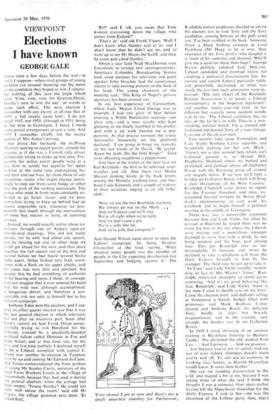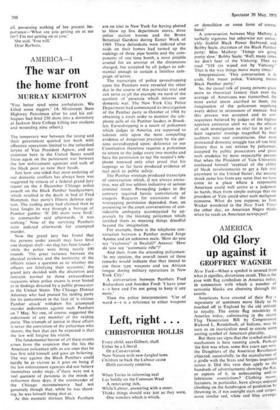VIEWPOINT
Elections I have known
GEORGE GALE
There were a few days before the war—in 1935, I suppose—when rival groups of young children ran around shouting out the name of the candidate they hoped to win. I remem- ber nothing of this save the jingle which went 'Vote, vote, vote for Gratton-Doyle, I).w ley's sure to win the day', or words to some such effect. The next election I remember with any clarity at all was that of 1955, a full twenty years later: I do not recall 1945, nor 1950, although in 1951, being at the time in Gottingen, I fancy I made some postal arrangement to cast a vote. And 1955 I remember chiefly for the manic quality of Mrs Attlee's driving.
She drove her husband, the ex-Prime Minister seeking to regain power, around the country as if she was a Finnish rally driver desperately trying to make up lost time. Fre- quently her police escort people were at a loss how to satisfy her appetite for speed without at the same time endangering her and their and our lives, let alone those of any incautious rustics who might chance unwit- tingly to step out from some hedge or other into the path of the rushing motorcade. The police who went in front were constantly ex- horted to go faster, faster, and we poor journalists trying to keep up behind had an almost impossible task, whenever we tem- porarily lost touch through the intervention of some bus, tractor or lorry, of restoring contact.
Instead, we would usually arrive about ten minutes through one of Attlee's open-air whistle-stop meetings. This did not really matter, for he only had about one speech, and by missing out one or other stage we could get ahead for the next, and thus piece together the full speech out of the first and second halves we had heard several hectic miles apart. Attlee looked very frail, some- times with a flush on his upper cheeks, and his voice was very thin and pinched; but despite this he had something of authority in his bearing and more, I think, of courage. I do not imagine that it ever entered his head that his wife was, although accomplished, a dangerous driver, and therefore a con- siderable risk not only to himself but to his election campaign.
Anthony Eden won the election; and I sup- pose its other quaint interest was that it was the last general election in which television did not play an excessive part. Soon after Eden's victory we had Frank Owen unsuc- cessfully trying to win Hereford for the Liberals, assisted by a peculiarly-bearded political fellow called Dominic le Foe and John Arlott; and at that time, too, for the first and last time publicly I declared myself to be a Liberal, complete with capital L. There was another by-election in Taunton, won by up-and-coming Mr Edward du Cann. The Tories commandeered the front parlour of young Mr Stanley Curtis. secretary of the local Farm Workers Union in the village of Simonsbath, because they had used it during the general election, when the-cottage had been empty. 'Young Stanley? He could not very well refuse the room,' said old Mr Igars, the village postman next door. 'Er asked first',
'Er?' said I, 'oh, you mean that Tory woman canvassing down the village who comes from Exford?'
`That's 'pl.,' said old Frank Vigars. 'Well, I don't know what Stanley said to 'er. and I don't know that he didn't say no, and 'er went up to see Mr Hayes the bailiff, and then he came and asked Stanley.'
About a year later Niall MacDermot won Lewisham, to strange new accompaniments. America's Columbia Broadcasting System took some pictures for television and guest speaker John Strachey had the cameraman return to take moving pictures of the back of his head. The young chairman of the meeting said: 'The King of Nepal's private secretary has been around too.'
In my first experience of Carmarthen, where Lady Megan Lloyd George was to triumph. I had one glass of beer before entering a Welsh Nationalist meeting—one glass only—and a man nearby who kept glancing at me finally fumbled in his pocket, and with a sly wink handed me a pep- permint. At that precise moment the young nationalist housewife on the platform declared: 'I am going to hinge my remarks on the last words of St David. "Be joyful. Keep the faith. Do the little things!"' Give your offending neighbour a peppermint.
And then in the winter of the next year we had Rochdale: the first to be televised, stop- watches and all. And there was Moira Shearer looking lovely in the back streets among the Monday washing-lines, and hus- band Ludo Kennedy and a couple of widows in their seventies singing at an old folks' club: `Now we are the two Rochdale mashers,
We always go out on the Mash . . h
And we'll dance and we'll sing.
We're all right when we're tight, And we don't care a jot, We're a jolly fine lot,
And we're jolly fine company!'
And Harold Wilson came down to open the Labour campaign, he being Shadow Chancellor at the time, saying, 'What shocked many people was the number of people in the City expecting devaluation last September and hedging against it.' The
'First chance I get to vote and there's not a single anarchist standing for Parliament',
Rochdale cotton employers decided to advise the electors not to vote Tory and the Tory candidate, coming bottom of the poll, cried out, 'I've been stabbed in the back.' Someone threw a black bathing costume at Lord Hailsham (Mr Hogg as he is now, then chairman of the Tory party), who dangled it in front of his audience and shouted, 'Who'll give me a quid for these bum-bags?' George Brown publicly rebuked Jack McCann, Labour candidate and eventual victor, for adopting a unilateral disarmament line. An ancient and superb Liberal patriarch richly and powerfully declaimed, in what was surely the last time such sentiments were ex- pressed: 'The very object of the Rochdale Reform Association is to secure a Liberal representative in the Imperial legislature'; and another ninety-year-old later, in far dillerent but scarcely more modern words, said to me. 'The Liberal candidate has no idea of the lot he's in with. They're a non- smoking teetotal bunch. I'm a crusted old- fashioned top-booted Tory of a rare vintage.
am one of the ale-can men.'
Two months later came Torrington, and Lady Violet Bonham Carter superbly and beautifully fighting for her son. Mark : 'There's not a spot around here which isn't hallowed ground to us—Mouth Hill, Blagberry, Shipload where we bathed and picnicked, and perhaps above all Gallantry Bowei with the flowering gorse all around and seagulls below. If we win, we'll light a bonfire on Gallantry Bower which will bring a glow throughout all the West Country'.
Randolph Churchill came down, to report
for the Evening Standard, and once, ex- asperated beyond restraint by Bessie Brad-
dock's electioneering, to cast aside his notebook and to begin himself a political meeting in the middle of Torrington.
There was, too, a memorable argument between him and Lady Violet. for when he arrived at Bideford he found there was no room for him in the inn where the Liberals were staying and a punctilious manager declined to serve him with a drink, he not being resident and the hour past closing time. This put Randolph into an un- derstandably ill humour and twice he declined to take a telephone call from the Daily Express brought to him by the manager. The third time he got up to take it.
`Ah I see,' said Lady Violet sweetly, 'respon- ding at last to His Master's Voice.' Ran- dolph, infuriated, promptly sat down again, muttering. 'And it's no good behaving like that, Randolph'. said Lady Violet. 'many is the time I used to dandle you on my knee'.
Came the election itself, and daffodils selling at threepence a bunch, hedges filled with primroses, and Mark Bonham Carter elected, and Anthony Royle, the defeated Tory, briefly in tears but bravely magnanimous, and in the evening, sure enough, the bonfire was lit on Gallantry Bower.
In 1959 I stood shivering of an autumn evening in Blackburn listening to Barbara Castle: 'We abolished the old, wicked Poor Law ... And I promise ... And we promise . .. Just because you've got Tv aerials sticking out of your rickety chimneys doesn't mean you're well off. Tv sets are an economy in working class homes, as Harold Macmillan would know.. It saves shoe leather.'
She saw me standing disconsolate in the cold, and nagged a bit at me, because I was taking notes of what she said. I think she
thought I was a turncoat, four years earlier having left the Manchester Guardian for the Daily Express. I said to her—she was the chairman of the Labour party then, that's
all, possessing nothing of her present im- portance—'What are you getting on at me for? I'm not getting on at you.'
She said, 'You will.'
Dear Barbara.



































 Previous page
Previous page